|
De Amerikaanse dichteres, critica en uitgeefster Juliana Spahr werd geboren op 7 april 1966 in Chillicothe, Ohio. Zie ook alle tags voor Juliana Spahr op dit blog.
If You Were a Bluebird
Began with a list.
A bird. Reed cormorant.
Added a fish and a monkey. Hingemouth. White throated monkey.
Added because.
Because the six dorsal and anal fins of the hingemouth and its two teeth
too and also its swim bladder like a lung, covered in alveoli.
Because the silvery wings, longish tail, and short head crest of the reed
cormorant.
Because the white throated monkey, with its red belly and its white legs.
Added the phrase the principle of relation.
Because it was with the principle of relation that the Niger Delta came to
habitat.
So the hingemouth with its six dorsal and anal fins of and its two teeth too
and also its swim bladder like a lung, covered in alveoli, swims.
So the silvery wings, longish tail, and short head crest of the reed cormo-
rant dives down to considerable depths in the Delta and also dives to
feed, as it tends to do, in more shallow water, bringing slow-moving
mormyrids and cichilds to the surface.
So the white throated monkey, with its red belly and its white legs, bangs
objects against the ground, throws sticks.
*
Then added another bird.
Eurasian spoonbill.
Added a crab and a fish.
Cleistostoma kuwaitense. Mudskipper.
Again added because.
Because the Eurasian spoonbill with its dark legs, occasionally grunting
and trumpeting.
Because the cleistostoma kuwaitense building a semi-permanent mud
hood over the entrance to its burrow.
Because the mudskipper digging a deep burrow then hiding in it during
high tide, a polygonal territory surrounded by dams, and defended
against rivals, yet also shared with digging crabs.
Added the phrase the principle of relation.
Because it was with the principle of relation that the Kuwait bay came to
teem.
So the Eurasian spoonbill with its dark legs, grunts and trumpets, sweeps
the end of its partly opened bill from side to side as it wades through
shallow water.
So the mudskipper builds its burrow beneath the mudflats, defends its ter-
ritory, keeps a pool of water so as to also engage in surface activity.
So the cleistostoma kuwaitense, using the same mud of these mud flats,
builds a semipermanent mud hood.
*
Then another bird.
Pelican.
Added a mammal and a fish. Bottlenose dolphin. Red snapper.
Returned to because.
Because the gregarious pelican, traveling in flocks.
Because the bottle nose dolphin, remembering and comprehending.
Because the nibbling and the picking of the red snapper with its short,
sharp needle-like teeth.
Returned to principle of relation.
Because it was with the principle of relation that the Gulf of Mexico came
to be activated.
So the gregarious pelican hunts, hunts cooperatively, plunge dives from
high up so as to stun the fish, scoops them up, and then also breeds,
breeds colonially, in trees, bushes, in the ground, around the gulf.
So the dolphins talks, talks, over thirty distinguishable sounds.
So the red snapper spreads itself out in the artificial reefs of oil platforms,
the smaller fish in the upper part of the water column, the larger in
deeper areas.
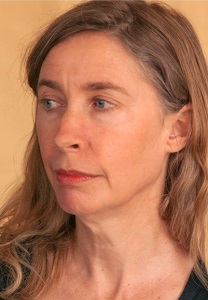
Juliana Spahr (Chillicothe, 7 april 1966)
De Nederlandse schrijver en columnist Özcan Akyol werd geboren in Deventer op 7 april 1984. Zie ook alle tags voor Özcan Akyol op dit blog.
Uit: Eus
“Ik ben geboren en getogen in de Koekstad, een niet al te grote plaats langs de IJssel, precies op het grensgebied van twee oostelijke provincies. Mijn vader kreeg van de fabriek een arbeidershuisje toegewezen in een industriestraat. Bijna in het centrum. Vlak voor ons kot liep een treinspoor. Daar reed vier keer per dag een goederentrein overheen. Hij vervoerde meestal dode dieren. Een paar huizen werden bewoond door Hollanders, maar dat waren rare mensen. Maatschappelijk mislukte losers. Wij noemden hen aso s. Zij noemden ons batsen. Dat zit zo: de meeste Turken hebben platte achterhoofden. Een bats is een schop. Een schop is plat. Krijg je een knal met het blad van de bats op je kop, dan heb je een plat achterhoofd. Mijn achterhoofd is niet plat. De enige slaapkamer in huis deelde ik met Mahir en Kosta. Mijn ouders sliepen beneden op de slaapbank. De ruimte was zo klein dat ik mijn plekje alleen kon bereiken door over de bedden van m n broers te lopen. Het zorgde zo nu en dan voor problemen, omdat zij mij niet zo mochten kinderlijke jaloezie van twee knakkers die de aandacht van hun ouders niet wilden delen met de nieuweling. Ze vielen me aan. Vaak op een strategische manier, zodat ik niet kon vluchten. Ik dolf telkens het onderspit omdat ik als tenger jongetje krachteloos en daarbij nogal bangig was. Die sukkels schopten net zo lang tot ze die ene voltreffer hadden uitgedeeld. Mijn vader haalde zijn schouders op als ik voor de zoveelste keer huilend van de trap liep, op zoek naar wat troost. Het huishouden viel onder de verantwoordelijkheid van moeder, net als de kinderen. Hij zou keihard werken en voor het geld zorgen, zoals dat van hem werd verwacht. De rest was niet belangrijk. Toch liet Turis zich vrij rap afkeuren. Zijn werkzame leven in Nederland duurde amper vijftien jaar. Pijnscheuten in de onderrug, liet hij de bedrijfstolk voor de arboarts vertalen. Maar van die rugproblemen hebben wij nooit iets gemerkt. Hij was vooral werkschuw. Liever lui dan moe. Dat idee.
Daarnaast had-ie een obsessie met geld. Als hij op een slinkse manier wat centen kon uitsparen, vergat vader de tucht en orde die hij dagelijks tot ons predikte. Zo moest ik regelmatig bij Vroom & Dreesmann op de uitkijk staan terwijl hij de prijskaartjes van schoenendozen verwisselde. Met die truc nam hij elk kwartaal schoenen ter waarde van veertig gulden mee voor maar vijftien piek. Als er visite was, pronkte hij heel trots met zijn nieuwe schoeisel. Dat hij het warenhuis voor een paar joetjes had opgelicht vertelde hij er nooit bij. Dat zouden zijn vrienden, van wie sommigen volgens de islam leefden en diefstal als een enorme zonde zagen, streng veroordelen. Door die gierigheid mochten we maar één keer per week douchen. Op donderdag. Dan moesten we met zijn drietjes sámen onder de lauwe straal.”
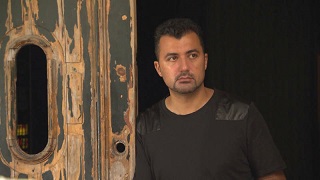
Özcan Akyol (Deventer, 7 april 1984)
De Engelse dichter William Wordsworth werd geboren op 7 april 1770 in Cockermouth, Cumberland. Zie ook alle tags voor William Wordsworth op dit blog.
The Passing Of The Elder Bards
THE MIGHTY Minstrel breathes no longer,
Mid mouldering ruins low he lies;
And death upon the braes of Yarrow
Has closed the Shepherd-poet’s eyes:
Nor has the rolling year twice measured,
From sign to sign, its steadfast course,
Since every mortal power of Coleridge
Was frozen at its marvellous source;
The ’rapt One, of the godlike forehead,
The heaven-eyed creature sleeps in earth:
And Lamb, the frolic and the gentle,
Has vanished from his lonely hearth.
Like clouds that rake the mountain-summits,
Or waves that own no curbing hand,
How fast has brother followed brother,
From sunshine to the sunless land!
Yet I, whose lids from infant slumber
Were earlier raised, remain to hear
A timid voice, that asks in whispers,
“Who next will drop and disappear?”
Though Narrow Be That Old Man’s Cares
THOUGH narrow be that old Man's cares, and near,
The poor old Man is greater than he seems:
For he hath waking empire, wide as dreams;
An ample sovereignty of eye and ear.
Rich are his walks with supernatural cheer;
The region of his inner spirit teems
With vital sounds and monitory gleams
Of high astonishment and pleasing fear.
He the seven birds hath seen, that never part,
Seen the SEVEN WHISTLERS in their nightly rounds,
And counted them: and oftentimes will start--
For overhead are sweeping GABRIEL'S HOUNDS
Doomed, with their impious Lord, the flying Hart
To chase for ever, on aerial grounds!
Sonnet
IT is not to be thought of that the Flood
Of British freedom, which, to the open sea
Of the world's praise, from dark antiquity
Hath flowed, 'with pomp of waters, unwithstood,'
Roused though it be full often to a mood
Which spurns the check of salutary bands,
That this most famous Stream in bogs and sands
Should perish; and to evil and to good
Be lost for ever. In our halls is hung
Armoury of the invincible Knights of old:
We must be free or die, who speak the tongue
That Shakespeare spake; the faith and morals hold
Which Milton held.--In everything we are sprung
Of Earth's first blood, have titles manifold
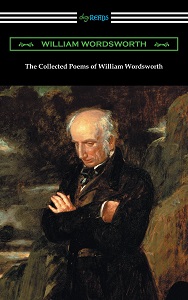
William Wordsworth (7 april 1770 – 23 april 1850)
Cover
De Chileense dichteres en diplomate Gabriela Mistral werd geboren in Vicuña, Chili op 7 april 1889. Zie ook alle tags voor Gabriela Mistral op dit blog.
The Shining Host
In vain you try
To smother my song:
A million children
In chorus sing it
Beneath the sun!
In vain you try
To break my verse
Of affliction:
The children sing it
Under God!
Rocking
A thousand waves
Divine the sea she rocks
I hear the loving seas
And rock my son, my son
Night fields of wheat
The wandering wind rocks
I hear the loving winds
And rock my son, my son
His thousands worlds
Silent God Father rocks
I feel His hand in shades
And rock my son, my son.
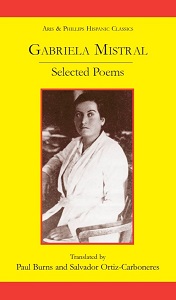
Gabriela Mistral (7 april 1889 – 10 januari 1957)
Cover
De Nederlandse dichter en schrijver Henk Fedder werd op 7 april 1890 te Amsterdam geboren. Zie ook alle tags voor Henk Fedder op dit blog.
Celwagen
De dievenwagen stopt vóór het station,
Geelgrijze auto op gloednieuwe banden.
Vier jonge mannen met geboeide handen
Staan plotseling in 't licht van d'ochtendzon.
Eén tilt een oogenblik zijn wit gezicht
naar lang ontbeerde zeeg'ning van dit stralen.
De tweede blijft onwennig even dralen,
Dan slaat een marechaussee de deuren dicht.
De derde proeft opeens een bloemengeur,
Hij ziet een venter met een mand vol rozen
- (Sie haben gegen Wehrmacht sich verstossen) -
De haat brandt aan zijn kop met koorts'ge kleur.
De vierde wou dat 't einde nu maar kwam,
Hij hoort de tram hard door een railsbocht gillen
en ziet de stad - zijn dunne lippen trillen,
Zóó neemt hij afscheid van zijn Amsterdam.
‘Die snuiters hebben vast wat uitgevoerd’,
‘Ze deejen niks dan oov'ral fietsen gappe’,
'Nou motte ze hun jaartjes op gaan knappe’,
‘Ze binne jong’ - ‘Afijn’ - ‘'t Is toch beroerd’.
Hoog boven dit geroddel straalt de zon,
Ze denken: straks zal die onz' angst genezen,
Waar zal het salvo in de hei op wezen?
Recht op ons hoofd? - Nee, dwars door 't hart als 't kon.
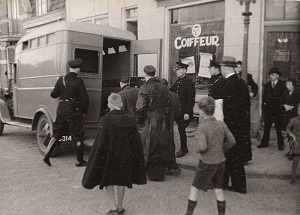
Henk Fedder (7 april 1890 – 29 mei 1979)
Een arrestatie in Amsterdam, 1940
De Amerikaanse schrijver Donald Barthelme werd geboren op 7 april 1931 in Philadelphia. Zie ook alle tags voor Donald Barthelme op dit blog.
Uit: The School
“Well, we had all these children out planting trees, see, because we figured that ... that was part of their education, to see how, you know, the root systems ... and also the sense of responsibility, taking care of things, being individually responsible. You know what I mean. And the trees all died. They were orange trees. I don’t know why they died, they just died. Something wrong with the soil possibly or maybe the stuff we got from the nursery wasn’t the best. We complained about it. So we’ve got thirty kids there, each kid had his or her own little tree to plant and we’ve got these thirty dead trees. All these kids looking at these little brown sticks, it was depressing.
It wouldn’t have been so bad except that just a couple of weeks before the thing with the trees, the snakes all died. But I think that the snakes – well, the reason that the snakes kicked off was that ... you remember, the boiler was shut off for four days because of the strike, and that was explicable. It was something you could explain to the kids because of the strike. I mean, none of their parents would let them cross the picket line and they knew there was a strike going on and what it meant. So when things got started up again and we found the snakes they weren’t too disturbed.
With the herb gardens it was probably a case of overwatering, and at least now they know not to overwater. The children were very conscientious with the herb gardens and some of them probably ... you know, slipped them a little extra water when we weren’t looking. Or maybe ... well, I don’t like to think about sabotage, although it did occur to us. I mean, it was something that crossed our minds. We were thinking that way probably because before that the gerbils had died, and the white mice had died, and the salamander ... well, now they know not to carry them around in plastic bags.
Of course we expected the tropical fish to die, that was no surprise. Those numbers, you look at them crooked and they’re belly-up on the surface. But the lesson plan called for a tropical fish input at that point, there was nothing we could do, it happens every year, you just have to hurry past it.
We weren’t even supposed to have a puppy.
We weren’t even supposed to have one, it was just a puppy the Murdoch girl found under a Gristede’s truck one day and she was afraid the truck would run over it when the driver had finished making his delivery, so she stuck it in her knapsack and brought it to the school with her. So we had this puppy. As soon as I saw the puppy I thought, Oh Christ, I bet it will live for about two weeks and then...”
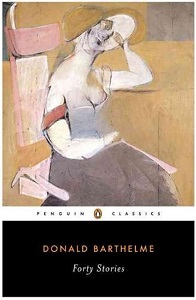
Donald Barthelme (7 april 1931 – 23 juli 1989)
Cover
De Deense dichter en schrijver Jens Peter Jacobsen werd geboren op 7 april 1847 in Thisted. Zie ook alle tags voor Jens Peter Jacobsen op dit blog.
Uit: Niels Lyhne (Vertaald door Annelies van Hees)
“Hij was moe, uitgeput, hij kon al die poëzie niet meer verdragen, hij snakte ernaar op de vaste grond van het dagelijks leven te staan, zoals een vis die stikt in de warme lucht moet snakken naar de heldere, frisse koelte van de golven. Het moest ophouden, het moest vanzelf overgaan. Bartholine stond niet meer onervaren tegenover leven en literatuur, ze was er evenzeer mee bekend als hij, hij had haar alles gegeven wat hij had gekregen en nu moest hij blijven geven. Dat was onmogelijk, hij had niet meer – zijn enige troost was dat Bartholine zwanger was.
Al een tijdje had Bartholine tot haar verdriet gemerkt dat haar beeld van Lyhne langzamerhand was veranderd en dat hij zich niet meer op de duizelingwekkende hoogte bevond waar zij hem in hun verlovingstijd had geplaatst. Ze twijfelde er nog niet aan dat hij een poëtische natuur was, zoals ze dat noemde, maar ze was afgeschrikt nu het proza af en toe zijn lelijke gezicht begon te tonen. Des te ijveriger joeg zij de poëzie na en poogde zij de oude toestand weer op te roepen door hem met een nog grotere rijkdom aan stemmingen, een nog diepere begeestering te overweldigen, maar ze vond zo weinig weerklank dat ze zichzelf bijna sentimenteel en geaffecteerd vond. Nog een poos probeerde ze de tegenstribbelende Lyhne mee te lokken. Ze wilde niet geloven wat ze vermoedde, maar toen langzamerhand het vruchteloze van haar pogingen twijfel wekte of haar geest en haar hart werkelijk zo’n grote rijkdom bevatten als ze had gedacht, liet ze hem opeens los, werd koel, zwijgzaam en gesloten en zocht de eenzaamheid om in alle rust om haar verloren illusies te treuren. Want dat zag ze nu in, dat ze bitter teleurgesteld was en dat Lyhne diep van binnen eigenlijk niet verschilde van haar oude omgeving en dat wat haar om de tuin had geleid zoiets gewoons was als dat zijn liefde hem een poosje een vluchtig aureool van geest en grootheid had verleend, zoals zo vaak gebeurt bij lagere naturen.”
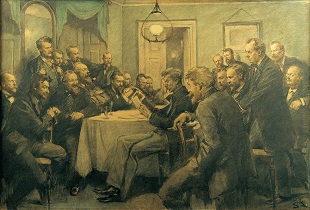
Jens Peter Jacobsen (7 april 1847 – 30 april 1885)
Jacobsen leest voor in de literaire kring "De Moderne Doorbraak". Getekend door Erik Henningsen, ca 1910
Zie voor nog meer schrijvers van de 7e april ook mijn vorige blog van vandaag.
|



